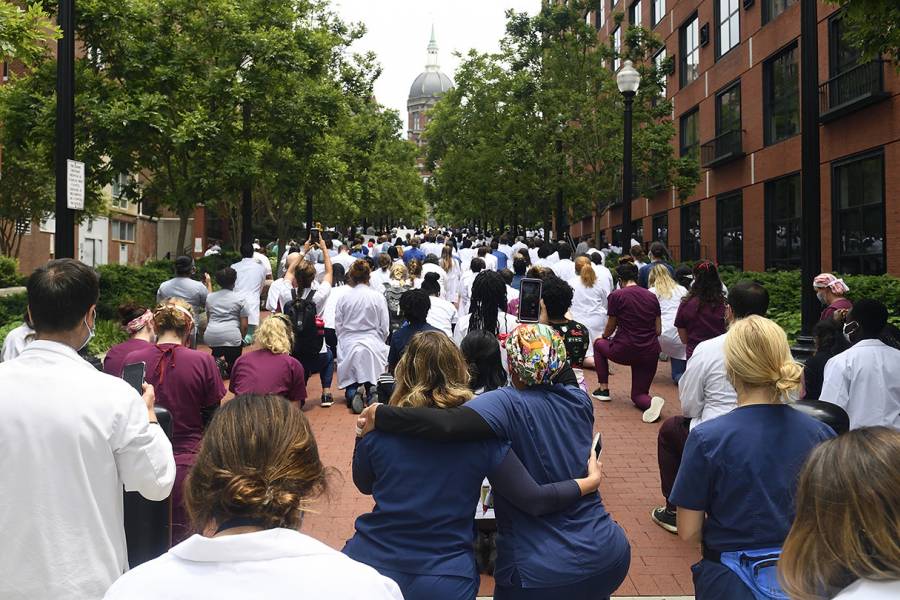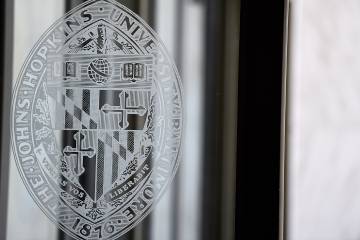Health care workers from across Johns Hopkins Medicine demonstrated their support for equality and racial justice on Friday by kneeling together during a national moment of silence honoring George Floyd and others who have died from police brutality.
Medical residents, postdocs, students, and other affiliates gathered at 1 p.m. on the East Baltimore campus as well as at other health system sites: Johns Hopkins Bayview Medical Center, Johns Hopkins All Children's Hospital, Howard County General Hospital, Sibley Memorial Hospital, Suburban Hospital, and the Johns Hopkins Home Care Group. They joined many health care professionals across the country in solidarity against senseless violence. The event was organized by White Coats for Black Lives, a national group founded by medical students.
Video credit: Johns Hopkins Medicine
Participants were encouraged to wear face masks and practice social distancing at the gatherings, where they read aloud the names of victims including Floyd, who died May 25 in police custody in Minneapolis. Those who weren't able to participate in person were asked to join virtually where possible and to look for social media posts with the hashtags #WCB4L, #HopkinsWC4BL, and #Hscdiversitycouncil.
Flora Kisuule, an immigrant from Uganda and one of the organizers of the observance at Bayview Medical Center on the front lawn of the Francis Scott Key Pavilion, said she was thinking about both Floyd and her 8-year-old son.
"I came here because this is the greatest country on earth—that's how I felt when I came here almost 30 years ago," said Kisuule, associate director of the Division of Hospital Medicine at Bayview and an associate professor of medicine. "It scares me that my son won't have the same image that I have and the same vision of this country when I came here all those years ago. … I still have hope. I came here with hope and I want for my son to have hope."
Thomas Elliott, a second-year pediatrics resident at the Johns Hopkins Children's Center and president-elect of the House Staff Diversity Council, read a statement during Friday's demonstration that identified racism as a "public health crisis." He urged Johns Hopkins to continue to work to translate its support for diversity, equity, and inclusion into "tangible and perceived impacts for not only the Hopkins community but the Greater Baltimore community as well."
"Recent killings of George Floyd, Breonna Taylor, Ahmaud Arbery, and so many more by police brutality have forced us to acknowledge the reality of anti-black racism, its long history, and its current force in our institutional and social structures and highlighted our responsibility for ending it," he said. "So today, we kneel in solidarity with White Coats for Black Lives, Black Lives Matter, and the protests and demonstrations around the country that are collectively asking us to dismantle racist policies and cultures in our communities.
"When we work together, we can dismantle all forms of oppression and racism within our institution and beyond."
Jessica Bienstock, professor of gynecology and obstetrics and faculty adviser to the House Staff Diversity Council, added: "As physicians, citizens, and human beings we must all speak out against injustice and inequity. I am proud of and grateful to the Johns Hopkins House Staff Diversity Council members who organized this event. Their work allows us, their teachers and colleagues, to commit ourselves to combating racism and becoming anti-racists. As a health care organization we are entrusted to restore and promote the health of the patients and communities we serve. As healers and teachers we must use our roles in society to repair the wrongs of the past and present and work together to make a positive difference in our society. The White Coats for Black Lives event was a meaningful step on that journey."
We recognize racism is a public health issue, a threat to the health & well-being of people of color, & we remain committed to serving the health care needs of our entire community. We condemn systemic racism & stand in support of social justice. #WhiteCoatsForBlackLives pic.twitter.com/xspqy3Nfe2
— Johns Hopkins All Children's Hospital (@AllChildrens) June 4, 2020
Posted in Health, Politics+Society
Tagged johns hopkins medicine, police violence, social justice









